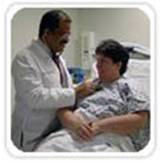- +91 9820036852
- sanjeev.jain@hiranandanihospital.org
- drsanjain@hotmail.com
Understand the Procedure
It is very important that patient who is undergoing surgery must talk to me in detail about the procedure. Learn from me what to expect before, during and after surgery. Ask me about the process of being admitted to the hospital, the type of anesthesia you might need, the type of implant that will be used, length of stay in the hospital, rehabilitation and pain management. I believe that more you know, the better you will be able to face the challenges and changes that joint replacement surgery will make in your life. Don't ever hesitate to ask questions, voice concerns or speak up when you do not understand.
Assemble Your Personal and Medical Information
During the weeks before your surgery, many people will be asking about your insurance coverage and medical history. You may feel that you are answering the same questions over and over again, but this redundancy is necessary to meet quality assurance and medical insurance guidelines. Be sure to include the following information:
- A designated family member or friend as your primary contact to receive information from me and disseminate it to other family members and friends.
- A list of all the doctors you currently see and your reasons for seeing them. Provide names, addresses and phone numbers.
- A list of all the medications you currently take on a regular basis. Copy the name of the medication, the dosage and the frequency (daily, twice a day, etc.) from the prescription. I may advise you to stop taking certain medications, especially blood thinner or supplements a week before your surgery.
- A list of any allergies or adverse reactions you've had to drugs or anesthesia in the past. Provide the name of the drug, why you were taking it, a description of your reaction and when this happened.
- A list of medical conditions and all previous operations, including those that are not bone-and-joint operations.
- Any dietary restrictions or other health problems you have, such as hypertension, diabetes, cardiac illness, asthma, HIV or hepatitis.
- A list of your insurance coverage's, including the name of the insurance company, the plan or group number and contact information. Be sure to bring your insurance cards to the hospital with you.
Get in Shape for Surgery
The physical preparations you make can affect both the outcome of the surgery and your recovery time. Most of these suggestions are common sense, although some may surprise you.- If you smoke, cut down or quit. Smoking changes blood flow patterns, delays healing and slows recovery.
- If you drink, don't have any alcohol for at least 48 hours before surgery.
- If you use any other types of controlled substances, tell your doctor. Narcotics and other drugs can have an impact on your surgery.
- Eat well. If you are overweight, I may recommend a weight loss program after surgery.
- Ask me about pre-surgical exercises. If you are having hip or knee replacement surgery, doing exercises to strengthen your upper body will help you cope with crutches or a walker after surgery. Isometric exercises can help maintain the strength of your leg muscles. Also ask about the exercises that will be prescribed after surgery. If you familiarize yourself with these postoperative exercises and practice them now, they will be easier to perform after the surgery.

